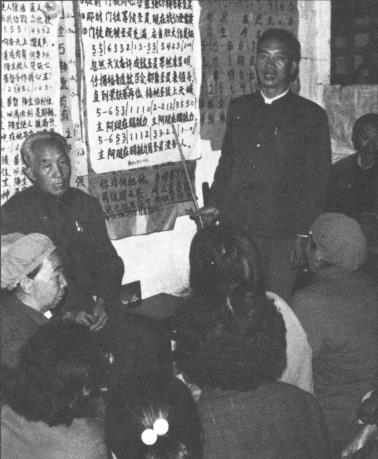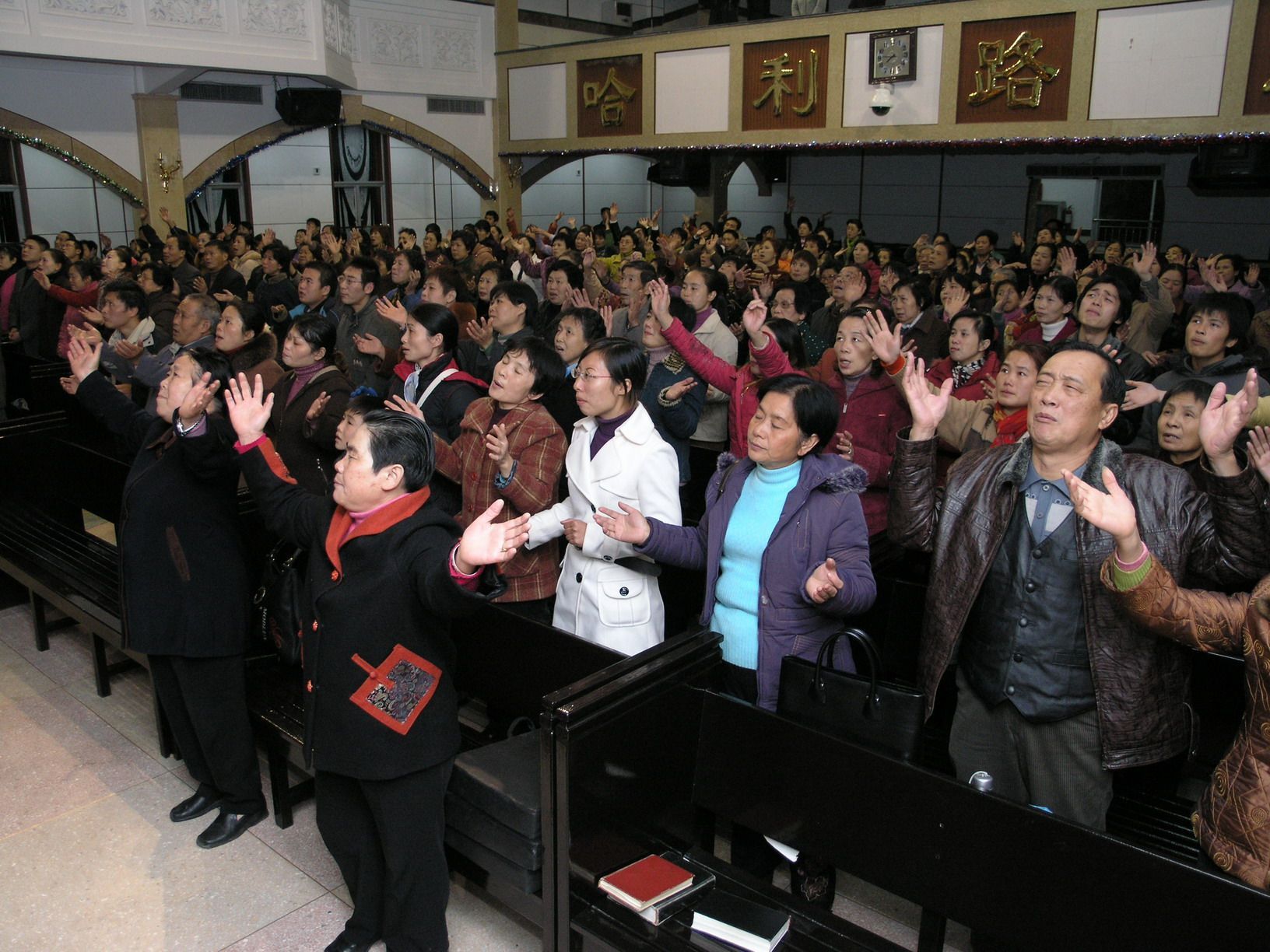1950s

A typical house church Bible study.
The Pastor Who Took Down a Picture of Mao
Many Christians around the world had welcomed the arrival of the new Communist regime in 1949. Chinese society under the Nationalist government was riddled with corruption, and it was reckoned the new rulers of China couldn't be any worse. Throughout China, however, Christians saw signs that the approaching Communist storm would be dark and destructive. The true nature of the Communist plans was revealed when Mao Zedong issued this dire threat:
"Whoever wishes to oppose Communism must be prepared to be mauled and torn to pieces by the people. If you have not yet made up your mind about being mauled and torn to pieces, it would be wise for you not to oppose Communism."1
The suppression of the Church in Shandong was gradual. For much of 1950 there was little trouble, as the new government gathered "evidence" to be used against the Body of Christ. Then the noose of restrictions began to tighten around Christians' necks. Services could only be held at certain times, and home fellowships were banned. Pastors were forbidden to visit church members, and all children were required to attend Communist meetings on Sunday mornings.
In December 1950, in the seaside city of Qingdao, Pastor Wang Deyun (David Wang) was visited by officials who demanded the use of the church building for a Communist conference a few days before Christmas. The pastor agreed on two conditions: that no political portraits or flags be displayed, and that no smoking would be permitted on the premises.
As soon as the conference began both conditions had been broken. A portrait of Chairman Mao was hung at the front of the sanctuary with flags on either side of it, while many in the audience were smoking. Wang, who was known as a gentle and non-confrontational person, realized a stand had to be taken. He "summoned his family into his study and asked them to concentrate in prayer for him. With shaky steps he walked to the door of the church on the first floor of the building. He went up the aisle of the crowded church, removed the portrait of Mao as well as the flags, and walked out."2
Wang's brazen act of defiance immediately made him a marked man. He fled south before the authorities could sentence him, so the Communists vented their anger on his sons and wife instead. They too managed to evade capture, and ultimately, after many stressful months, the whole family reunited in Hong Kong, where Wang Deyun worked for the Christian and Missionary Alliance until 1968. Wang and his wife later migrated to Europe where they continued to serve the Lord among Chinese churches until their deaths.
The Wind Blows Where it Pleases
Although the 1950s was marked with much brutal persecution of Christians in Shandong, the life and power of the Holy Spirit could not be extinguished from the hearts of those who loved God. As the government unleashed waves of dire persecution against the Church, they ordered all Christians to register and face a public trial. One elderly brother lived a simple, consecrated life in a remote village. His pastor had tried to train him what to say under questioning, but the old man replied he would only say what the Spirit of God told him to say at the time.
The Communist official began the interrogation by asking, "What has Christianity done for you?"
"It's made me a better man," the elderly farmer replied.
The official turned to the assembled villagers and asked if this was true. "Yes!" they emphatically replied. "His farm used to be the dirtiest and worst in the village but now it is the best." When he was pressed to explain how these changes had occurred, the farmer spoke with great power and authority:
"I was a drunkard and an opium smoker. Nothing could rid me of those two vices, and my farm had been brought to ruin. But I accepted Jesus as my Savior, and He changed me. He enabled me to break with both opium and drink. My fellow villagers can now testify to these things and my farm is now the best. Ask them."3
As the Communists tried to transform the country in the 1950s, they struggled to deal with the true testimonies of simple-hearted believers like the elderly Shandong farmer.
On another occasion, a house church leader had a dream, in which he saw himself visiting Miao village about 15 miles (24 km) from his home. He saw a man and his wife preparing breakfast, but all they had to put into their pot was grass and leaves. The leader declared, "Miao village has turned to the Lord and some of its people have started a fellowship. We must take them some grain."
A man immediately set out in a cart loaded with food, and arrived at Miao village a few hours later. On arrival, "he found things just as in the dream. The Holy Spirit had fallen on the man and his wife, and they had given all they had to the poor.... They held a joyous feast which the neighbors joined in. Many immediately turned to the Lord when they saw the grace that was given."4
When the Holy Spirit swept through the villages of Shandong in great power, the revival touched every community in one district except one isolated village. The young people of that village were mystified as to why God had bypassed them alone, and they sought the advice of house church leaders. "Much prayer has been prayed," the young men explained. "Idols have been torn down and burned, and many of the villagers have apparently been converted, but things remain as before. There is no revival and no manifestation of the work of the Holy Spirit."
The leaders prayed earnestly, seeking to put aside their human wisdom to gain the mind of Christ on the matter. The Spirit of God revealed that there was hidden sin in the village and that His blessings were being withheld as a result. It was revealed to them that certain idols of earth gods had been buried in the ground by the older men of the village.
Shovels were used to dig up the pots containing the idols, and "when the last had been removed, destroyed and burned, revival began. The rejoicing in that village was mingled with awe and the fear of God."5
Zhang Tangwu
Shandong is a province where many old men and women of God died for the gospel in the 1950s and subsequent decades. One such brother was Zhang Tangwu from Weifang.6 Zhang, who had never married, was thrown into prison in the 1950s, where he contracted a strange skin disease on his upper back.
Even when he was taken to court and questioned by judges, Zhang smiled and told them about Jesus' love. In prison his witness was so strong that the other inmates gave him the nickname, 'Living Jesus.' He always shared his meager portions of food with the other prisoners.
Zhang was sentenced to death, and as he awaited the day of his execution his disease grew so bad that puss openly oozed from his back. The prison doctors were convinced he would soon die. For many years this man of God had prayed that he would not die in prison, but that he might die on the mission field spreading the gospel with sinners.
The other prisoners were terrified of Zhang's disease, and believing he would soon die anyway, they threw him out of their cell and made him sleep in the disgusting latrine, covered in human excrement and urine. The officials began to make arrangements for Zhang's burial the next day. Covered in open sores, they knew the unhygienic surrounds of the latrine would quickly cause infection. Throughout the day, despite death knocking at his door, Zhang continued to preach the gospel to every prisoner and guard who came to use the toilet.
With tears in his eyes and in great anguish of soul, Zhang Tangwu cried out in a loud voice that could be heard throughout the entire prison, “I am not crying because of my sick body or because of my impending death! I am crying because of the death of the gospel among you all! Your souls are precious to God. He loves you and longs to call you His children.” He then sang from the depths of his heart, 'My thoughts are not clean.... My love is not pure.'
Zhang knelt down in the excrement and wept bitterly for the opportunities he had wasted in his life. He decided he must share the gospel with everyone in the prison while he had the chance. Painfully, he dragged his half-dead body out of the latrine. With the Lord’s help he inched his way to the prison courtyard, which had a mound of stones in the center. He climbed to the top of the mound and held on to the top stone. With a loud voice he proclaimed, “Everyone listen to me! You must receive Jesus Christ as Lord!” All the prisoners could clearly hear him because the cells faced toward the courtyard.
Right at that moment the ground shook. An earthquake came from nowhere and the prisoners were terrified. They were afraid because of the earthquake, but also because they couldn’t understand how Zhang had been able to drag himself back from death’s doorstep to preach to them in such a loud and authoritative voice.
Because of the exertion of dragging himself from the latrine to the courtyard, Zhang Tangwu's infected back had split into two. The skin between his two shoulder blades was no longer joined together and puss flowed down and covered his waist and legs.
The prison guards finally came and carried him back to the latrine. They decided not to shoot him because they expected him to die within hours anyway.
The next day when they came to inspect Zhang they were amazed to find that somehow his back had become better and was healed! Within three months he recovered completely! Terrorized by the supernatural events that had displayed the glory of God, the prison authorities were too afraid to deal with Zhang, and they released him from prison.
A Great Leap Backward
The 1950s had been a terrible decade of severe persecution for the Church in Shandong, but the situation was exacerbated further when Mao launched the disastrous 'Great Leap Forward' in 1958. Rarely has an initiative been so misnamed, as millions of people starved to death and untold misery and suffering was inflicted on the population.
The idea behind Mao's campaign was to rapidly turn China from an agrarian society into a modern industrialized nation. Millions of people were forced to migrate to other regions, rendering manual labor as the government built massive water irrigation projects and other initiatives. Mao spoke of China's economy passing that of the United Kingdom and the United States within 15 years. Private farming was outlawed, and those who engaged in it were punished and labelled 'counter revolutionaries'.
Instead of achieving its stated goals, the Great Leap Forward was an economic catastrophe for the country. Believing that steel production was a key to becoming a world economic power, Mao ordered the construction of backyard furnaces throughout the country. People were forced to hand over farm tools, pots, pans, doorknobs and any objects made of metal, with the intent that the country would benefit with millions of tons of steel to build their new utopian society. In reality, the quality of the steel produced was poor and unusable, and villages were left with unseemly blobs of twisted metal and unused furnaces.
Historians have looked back on the Great Leap Forward with contempt at the sheer stupidity of it. China had embarked on "one of the greatest failed experiments in human history. The Communists tried to abolish money and all private property.... China plunged into a famine of staggering proportions—an estimated 30 million Chinese starved to death (some put the figure at 60 million)."7
The social fabric of society was torn apart as an iron fist of fear and intimidation descended on the population. People were urged to report any suspicious activities among their own family members, and countless millions of couples were forced to divorce as the state asserted pre-eminence over people's personal lives.
Christians throughout Shandong went into survival mode during this dark time. Most church leaders were arrested and received long prison sentences, often of 20 years or more. Hundreds of pastors were killed or perished in the harsh prison labor camps.
Although the shepherds had been removed by the government, many Christians continued to meet discreetly in small groups of three or four. Often the believers walked into the forest or the hills to have their meetings, to lower the chance of detection and being reported to the authorities. The Church throughout Shandong survived, however, as the Holy Spirit had already done a deep work in the hearts of countless thousands of disciples before the excesses of the 1950s and '60s.
Irene Hanson — The Last Missionary to Leave Shandong
After the Communist Party assumed control of China in October 1949, the hundreds of foreign missionaries stationed in Shandong knew their remaining time on Chinese soil would be short. Many left voluntarily before the approaching storm, while others remained to the bitter end, not knowing if death or deportation awaited them.
Irene Hanson, an American Presbyterian, is believed to be the last missionary to leave the province. After serving the people selflessly for more than 25 years, she was deported from China in 1951. Hanson later wrote,
"War had been declared against the Church; a subtle, divisive guerrilla war that broke out in unexpected times and places; a war that was hidden by day and waged insidiously at night..
A Communist was appointed head of the Christian Church of China and began to speak for all groups, without giving any the right of dissent. He handed down edicts that forced a fearful obedience on church leaders and members alike. Anyone who dared to differ with his directives was branded as a 'spy,' or a 'running dog of the Imperialists.' Freedom of religion came to be defined as 'Freedom to persecute."8
Hanson owned a pet parakeet, which she had trained to repeat a few phrases. Sensing she would need all the encouragement she could get, she taught the bird to say, "You believe the Lord" in Chinese. The missionary gained strength from this strange source, and said, "Often when I returned from a Communist grilling, shaken and disheartened, he would bring back a smile by talking to me."
The day of reckoning finally arrived, and Hanson was hauled before a hate-filled Communist court. "Kill her!" they screamed. "Kill her! She is an American spy and doesn't deserve to live!"
Much false information had been spread by the Communists to discredit missionaries, but not so well-known are the numerous accounts of how brave Chinese Christians risked their lives by taking a stand for truth and refusing to give false testimony when ordered to do so. A man named Ga Li was called to give evidence against Hanson. "Isn't it true that she used mission funds to pay for spying activities against the People's Republic of China?" Ga Li was asked.
"'It is not,' he responded in a clear voice. She has not used any mission funds except for the expenses of the church. Every cent of money spent has been accounted for.... She is not a spy. She has not been working against China. She is a friend of our people and our nation. She does not deserve to be on trial today.'"9
The judge was infuriated, as Ga Li was the prosecution's chief witness against the missionary. Because he had stood up for the truth, the case against Hanson was thrown into disarray. She was sentenced to "eternal deportation," never to be afforded the privilege of setting foot in China again.
Before her departure, Hanson received a secret visit from an elder of a Shandong church, who had walked many miles from the countryside. He slipped in through the back door of the missionary's home and said he had an important message from God to share with her. "The four things I have to tell you are from God," he emphasized, as he counted them off on his fingers...
"One, tell the people in America not to be too discouraged about the Chinese Church. Two, tell them their gifts and offerings have been accepted by God. Three, the Church in China will go through great persecution and a time of winnowing the chaff from the wheat. Four, the Church will come back in great revival."10
Rarely have more accurate words been prophesied in China. Irene Hanson was unceremoniously removed, but as she boarded the ship, her pet parakeet was released from its cage by friends. It flew straight toward a crowded apartment block, telling the people again and again, "You believe the Lord! You believe the Lord!"
© This article is an extract from Paul Hattaway's book 'Shandong: The Revival Province'. You can order this or any of The China Chronicles books and e-books from our online bookstore.
1. Cliff, Fierce the Conflict, p. 153.
2. Cliff, Fierce the Conflict, p. 158.
3. Rees, The Jesus Family in Communist China, pp. 72-3.
4. Rees, The Jesus Family in Communist China, p. 73.
5. Rees, The Jesus Family in Communist China, p. 85.
6. This testimony was told to the author by a senior house church leader, March 2002.
7. Caroline Liou et al., China (Hawthorn, Australia: Lonely Planet Publications, 2000, 7th edition), p. 40.
8. Irene Hanson, The Wheelbarrow and the Comrade (Chicago, IL: Moody Press, 1973), p. 160.
9. Hanson, The Wheelbarrow and the Comrade, pp. 179-80.
10. Hanson, The Wheelbarrow and the Comrade, p. 169.





